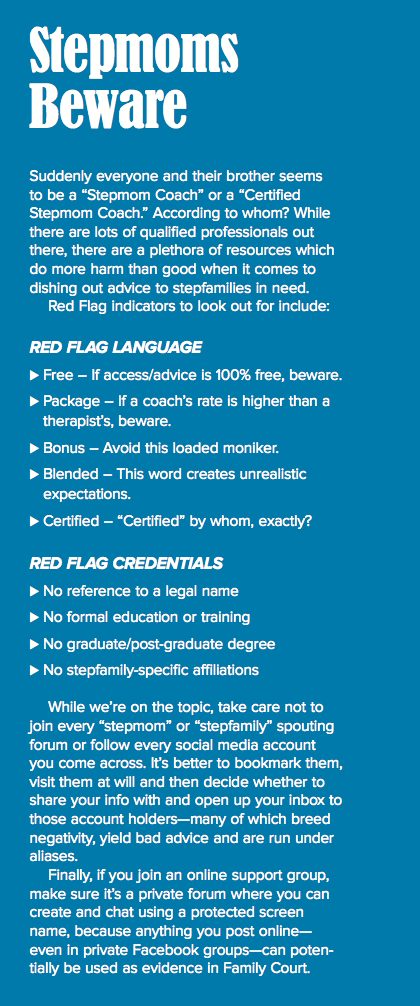
It’s so much harder than you expected it to be. Hell, if you’re gonna be really honest, it’s so tough you spend inordinate amounts of time wondering if it’s even worth it. What is this “it” that’s causing you—and others like you—to feel so much consternation? It’s the experience of being, or the thought of becoming, a stepmom.
“I’ve been living a sad tale for 16 years,” a reader recently shared on the StepMom Magazine Facebook page. “I wonder now if it was worth it.”
She then wondered aloud whether having her partner’s kids over for Wednesday dinners and every other weekend—versus pursuing and receiving 50/50 custody—would’ve been easier on her, her partner and her stepkids. This stepmom questions her choice to have partnered with a man who brought children and what sounds like a high-conflict ex into the mix.
“It has been hell for all of us,” she concluded.
Sixteen years have passed since she first entered into this partnership. I’d venture to guess that she never anticipated such pain early on. Or that, in the throes of love, she (quite like the rest of us) adopted a “Love conquers all!” attitude. Hmmm, look where that got her.
Help! (Or Will It?)
Ahhh, sweet elixir: Love. Too bad it only works as a temporary coping mechanism.
I can’t help but wonder whether this woman ever sought help for the challenging issues she spoke about on Facebook. If so, how successful was she in finding it? Did it require her to go from therapist to therapist until she found one who didn’t treat her as if she was entirely responsible for whatever emotions her stepkids might feel in a given moment?
Did she, perhaps, shell out a few hefty clams to hire a dubious, self-proclaimed stepmom coach who purportedly had all the answers? One who said she’d been there, done that? Or, worse, sign a contract for 6-weeks of pre-paid consulting services that included a FREE magic wand and stepmom fairy dust to sprinkle over everything, hoping to turn her lumpy family into an eerily-blended one?
While the momentary relief may have felt great, when it came to complex stepfamily dynamics, it seemed as if she was being spoon-fed nothing but Pablum. Suddenly her initial sense that she was being heard and understood by someone who could relate on a truly intimate level soured in her stomach, leaving her to feel nothing but empty, broke and naïve.
Maybe she’s you! Did you know, upfront, what life as a stepmom required of you?
It’s doubtful. The list of circumstances which blindside us runs more than a mile long. These are things none of us ever expected to deal with: intrusive exes, hesitant or hostile stepkids, an across- the-board lack of boundaries, permissive partners who seem more comfortable operating from a place of guilt than pushing a common-sense parenting agenda, etc.
Sound advice and informed guidance may seem hard to find, but they exist.
For starters, I’ll help you figure out which so-called “resources” you should definitely be wary of. Then I’ll set the record straight on deciphering stepmom mumbo jumbo disguised as “expert advice,” telling you what fine print to look out for so you can safeguard your sanity and your bank account. Lastly, I’ll offer a few final suggestions for finding the best help there is.
Right now, mind you—versus 16 years from now.
Buyer Beware
You’re your most vulnerable when you feel stuck, lonely, angry, confused or as if you were sold a faulty bill of goods. That is, when you look in the mirror and hardly recognize the sad woman staring back at you. You used to be so happy! Now? You just try to make it through the “on” weekend, gritting your teeth as the ex comes knocking or shoots off a meddlesome text.
Your white flag’s raised high and you think, “OK. OK. I’m done! I need some help. I can’t figure this out on my own. I need professional guidance.” Amazon, Google and Facebook may already be one step ahead of you. Every click seems to serve up product suggestions, page links and platitudes aimed at helping stepmoms turn their families around.
Suddenly, it can seem, stepmom message boards and sites targeting stepfamilies have joined in the conspiracy. Splashed across each one are smiling pictures of women and men beneath which appear titles like “Stepmom Coach” or “Certified Stepmom Coach.” Their pitches are generously peppered with terms like “bonus mom,” “bio mom” and “blended family.”
Worse, they promise quick solutions to serious challenges, a la:
- “How to Co-Parent!”
- “How to Be Friends With His Ex!”
- “How to Get the Kids to Love You!”
- “How to Love Them Like Your Own!”
Be wary! When clicking thru to read these people’s About Me details, you may be hard pressed to find any sign of formal education and training, stepfamily-specific affiliations, graduate-level study, a post-graduate degree or a specialization in:
- Counseling
- Social Work
- Psychiatry/Psychology
- Marriage and Family Therapy
If they tout their “Certified” status, dig even deeper. What are their true credentials?
Is their advice anecdotal (limited to personal insight) or research- and experience-based? Do they have a designation recognized and regulated by the state you live in? What’s their formal education? Who are they accountable to (i.e., the state, a university)? Is their work published? If so, where? What are their fees? Ballsy charlatans charge more than some licensed therapists.
Besides being floored by that Facebook post (Yes, “It has been hell for all of us,” still rings in my ears), my week has been filled with one complicated stepfamily situation after another. I am, thus, convinced that anyone working with stepmoms or stepfamilies should possess a great deal of experience and a graduate degree in counseling, psychology and/or social work.
Keep in mind that there are highly-educated, registered and licensed therapists who coach or offer consultation for stepmoms and entire stepfamilies. The term “Stepmom Coach” itself doesn’t mean that the person advertising their services is not an experienced therapist or counselor. You should, however, determine which is true for them.
None of this is meant to scare you. It’s meant to educate you. Hiring a professional shouldn’t be a crapshoot. While some of these folks may be good at what they do, if they’re not properly educated, trained and experienced it’s you who loses. Ask yourself if you have that kind of time and money to waste. You need advice and you need it now— but you need it to be right!
On a related note, never take advice from an anonymous or aliased source.
Refine Your Search
You get what you pay for. You’ve heard this adage over and over again.
There’s a reason for its sustained popularity. When people cut corners to “save” money, they often end up wasting money. So what makes the expertise of a stepmom coach, marriage counselor or psychotherapist valuable, when it comes to advising your stepfamily? First off, they should know that first family complications are amplified in repartnerships with children.
The problems stepfamilies face are unique to second families. In fact, first-family solutions often lead to disastrous results in second families. Anyone working with stepfamilies should be well-trained and sufficiently qualified to understand the unique factors and dynamics which naturally accompany life for second families.
Additionally, while a therapist may initially work with a stepcouple to overcome difficulties related to the integration of the new family, their capabilities should go beyond that. Once solutions to stepfamily life are found and implemented, couples often realize they face other challenges— issues most people experience when they’re in love and living together.
Still, stepcouple relationships are more complicated than that. When we partner with someone who has children, our couple’s time and development is short-circuited. Everything and everyone is thrown into the pot at once. Coping with all of that can be like trying to create a unified picture using random puzzle pieces. It just won’t work.
A qualified coach knows that one-size solutions do not fit all stepfamily situations.
Some couples seek help believing that their problems stem from being a stepcouple. In the same way, they may believe that their kids’ problems stem from being stepkids. The therapist who sees this couple must be able to distinguish between problems which arise out of the stepfamily dynamic and problems which are specific to individuals within that stepfamily.
I also encourage you to do some of your own research on this topic. A simple internet search will do. Get familiar with your state’s standards for professional training, designation, licensing, registration, educational credentials and other functions associated with being a coach, counselor, social worker, marriage and family therapist, psychiatrist, etc.
As you wrap up your research and focus on choosing someone to work with, lean toward those who offer a holistic approach—examining the family structure to get a sense for how each member is linked and relates to the others. In the case of a stepfamily, they should care about the impact exes and in-laws have on you, as a stepcouple, and on your stepkids.
It’s not uncommon for your background, religion, education and culture to also be taken into consideration. This may sound like minutia, but stepfamilies are intricate and often tangled. There are many hurdles to overcome, in order to manage yours successfully. Receiving the best help possible will give you and your partner the greatest shot at long-term success.
 Arrive at a Sound Solution
Arrive at a Sound Solution
Do you want the right kind of help? Then do your homework.
Depending on where you live, there’s usually a variety of therapists, marriage counselors and coaches to choose from. One way to whittle down your list is to find out how familiar each one is with the idiosyncratic problems stepcouples face. Again, even well-qualified but inexperienced therapists may dispense first-family advice that’s harmful when applied in a stepfamily.
For example, expecting to “blend” a family is unrealistic. Honestly, I don’t even know what that means. We don’t usually qualify a first family with a fancy adjective. They are merely a family. Imagine how absurd it would be to label all first families “happy families.” The term “blended family” emerged in 1972 from an anonymous—or unnamed—source.
This term causes consternation for millions of stepcouples.
Those couples then chide themselves or blame one another for not creating a family that feels as if it’s “blended.” It’s an unnecessary and unwise expectation, just as it would be if society insisted on holding all families of origin, or first families, to a “happy family” standard. The National Stepfamily Resource Center is in agreement on this.
A division of Auburn University’s Center for Children, Youth and Families (CCYF), the NSRC states: “Referring to stepfamilies as ‘blended families’ is troublesome to stepfamilies and the professionals who work with them. It is a catchy media phrase that does not describe either a family relationship or what happens when at least one partner to a marriage brings children from a prior relationship (into the mix—be it a divorced parent, unwed parent, widow or widower).”
“Stepfamilies do not ‘blend’,” they continue. “Children in stepfamilies do not lose their individuality or their connection and active attachment to the parent who is not part of the remarriage of mother or father. A stepfamily does not recreate a first family.”
Be leery of any therapist or coach who offers to help you blend everyone together or advertises a miracle cure for newly blended families. This screams that they lack the education and expertise required to recognize how harmful this phrase is to couples and stepmoms, by setting unrealistic expectations that family members adjust in a smooth and cooperative manner.
A trained professional has worked hard to earn their academic credentials and has accrued years of experience working on a full range of complex issues faced by stepmoms and their families. He or she is also held to strict protocols for professional ethics, continuing education and state regulations governing their practice. And many now work remotely with clients.
If you have trouble finding someone nearby, you can always choose to work with someone who offers counseling via Skype, Facetime or Vee. Whomever you select, spend your time and money wisely. ’Cause, while I know you’ve reached your limit and want help now, this is no time to throw money to the wind and tempt buyer’s remorse.
Your present and future happiness are worth far more than that!
Click here for a list of StepMom Magazine-Approved Therapists & Coaches
♥
If you liked this article, you’ll LOVE the monthly magazine.

